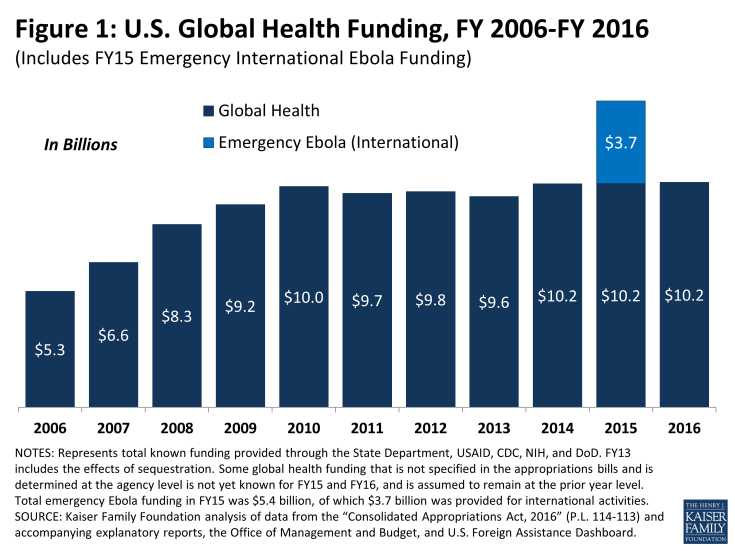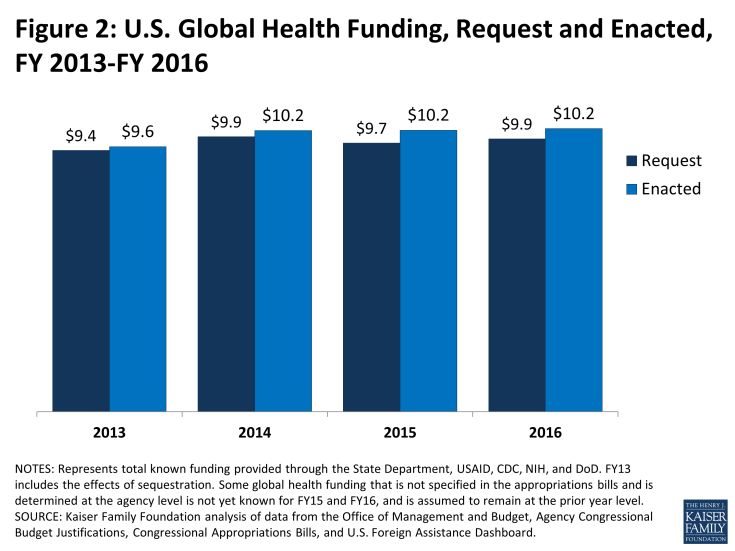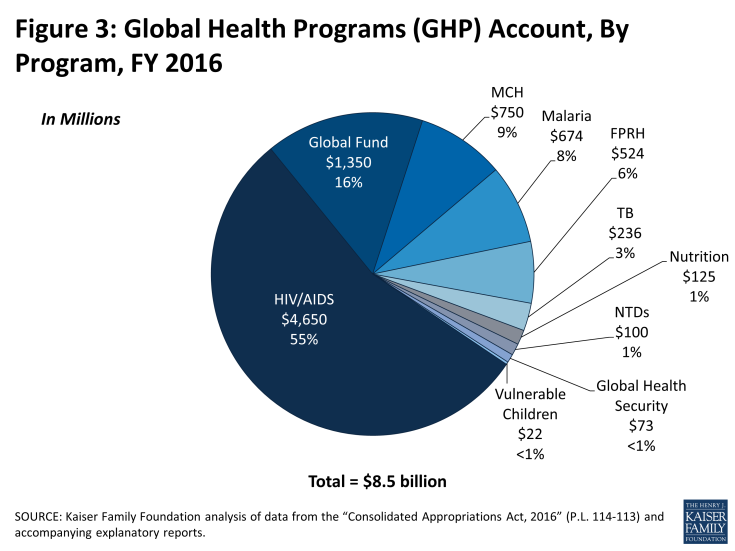The U.S. Global Health Budget: Analysis of Appropriations for Fiscal Year 2016
Overview
After Congress provided an unprecedented level of emergency funding for Ebola in FY15 in response to the West African outbreak, beyond regular appropriations for global health programs, FY16 returned to business as usual.1 There was no additional emergency funding and global health amounts remained essentially flat funding compared to prior years. The FY16 Omnibus Appropriations bill, which was signed into law by the President on December 18, 2015, included an estimated $10.2 billion in funding for global health programs continuing a trend of essentially flat funding since FY10 (see Figure 1).2
At the same time, because base funding within the international affairs budget,3 which provides almost 90% of all global health funding,4 declined in FY16, global health increased as a share of the international affairs budget for the second year, rising from 20% in FY12 to 23% in FY16 (see Table 1). Congress also continued its trend of providing more funding for global health than was requested by the President, which it has done in each of the past four years (see Figure 2).
Within the international affairs budget, most of the global health funding ($8.5 billion) specified in the FY16 Omnibus is provided through the Global Health Programs (GHP) account at U.S. Agency for International Development (USAID) and the State Department, which includes funding for the President’s Emergency Plan for AIDS Relief (PEPFAR) and the President’s Malaria Initiative (PMI), as well as other global health programs (see Figure 3 and Table 2). Within the GHP account, maternal and child health (MCH), nutrition, and malaria, were the only three programs to increase compared to FY15; all other programs remained flat.
Funding by Program
This section provides an overview of global health funding levels by program area as specified in the FY16 Omnibus Appropriations bill (unless otherwise stated, all comparisons are to FY15 enacted levels).
PEPFAR/Bilateral HIV
PEPFAR’s bilateral HIV funding through the GHP account totaled $4,650 million ($330 million at USAID and $4,020 million at the State Department), matching the FY15 level, but more than $300 million less than its peak level of funding ($4,959 million) provided in 2010. Bilateral HIV accounts for the largest share (55%) of any program area within the global health portfolio under the GHP account. It includes funding for microbicides research ($45 million) and the U.S. contribution to the Joint United Nations Programme on HIV/AIDS (UNAIDS) ($45 million). The Omnibus bill also provided $128.4 million in HIV funding through the Centers for Disease Control and Prevention (CDC) and $8 million for HIV programs at the Department of Defense (DoD); both totals match FY15 levels. Additional funding for HIV research at the National Institutes of Health (NIH) is not yet known (in FY15, it was $451.2 million).
Global Fund to Fight AIDS, Tuberculosis and Malaria (Global Fund)
The Omnibus bill included $1,350 million for the U.S. contribution to the Global Fund, matching the FY15 level, which was $300 million below the peak level of $1,650 million provided in FY14. By law, U.S. contributions to the Global Fund may not exceed 33% of total contributions from all donors for a specified period; prior to the FY16 Omnibus bill, the period was from 2009 to the present. The FY16 Omnibus bill, adjusted this time period by making 2004 the starting year. The Global Fund accounts for the second largest share (16%) of U.S. funding for global health (in the GHP account).
Tuberculosis
Funding for tuberculosis (TB) programs through the GHP account totaled $236 million, which matches the FY15 level. Additional tuberculosis funding provided through the Economic Support Fund (ESF) and the newly reconstituted Assistance for Europe, Eurasia, and Central Asia (AEECA) account is not yet known (in FY15, $6.3 million was provided for TB through the ESF account).5
Malaria
Malaria funding totaled $674.0 million and was one of only three program areas under the GHP account that increased above FY15 levels (an increase of $4.5 million or 1%). Additional malaria funding through the CDC and for research activities at the NIH is not yet known for the FY16 Omnibus; Malaria funding provided through DoD is not yet known for either FY15 or the FY16 Omnibus (in FY15, CDC funding was $11 million and NIH research funding was $169 million; in FY14, DoD was $17 million).
Family Planning & Reproductive Health (FP/RH)
Congress stated in the Omnibus bill that total bilateral funding for FP/RH programs should be “not less than $575 million” ($524 million through the GHP account and $51 million through other accounts such as ESF and/or AEECA), matching the FY15 enacted bilateral funding level.6,7 The Omnibus bill also included $32.5 million for the U.S. contribution to the United Nations Population Fund (UNFPA), a decrease of $2.5 million (7%) below the FY15 enacted level. While the Omnibus bill maintains existing policy requirements prohibiting the use of foreign assistance to pay for the performance of abortion as a method of family planning or to motivate or coerce any person to practice abortion, it does not include a reinstatement of the “Global Gag Rule,” which required foreign non-governmental organizations (NGOs) to certify that they would not perform or promote abortion as a method of family planning using funds from any source as a condition for receiving U.S. funding – a provision that had been included in the House State and Foreign Operations (SFOPs) appropriations bill, but not the Senate version.
Maternal & Child Health (MCH)
MCH was one of the three programs that received increased funding in FY16 in the GHP account which totaled $750 million in the FY16 Omnibus, a $35 million (5%) increase above FY15 levels. This includes $515 million in funding for bilateral programs, of which $51.5 million is for Polio, and a $235 million contribution to GAVI. The increase in MCH funding is entirely attributable to increased funding for GAVI (see below). Additional funding for MCH is provided to the CDC and State Department. Some additional MCH funding provided through other accounts at USAID, such as the ESF and Development Assistance (DA) accounts, is not yet known.
Specific components of MCH funding provided USAID as well as CDC and the State Department is as follows:
- GAVI: The U.S. contribution to GAVI, which is included under MCH funding in the GHP account, totaled $235 million, a $35 million (18%) increase above FY15.
- Polio: U.S. funding for polio programs is provided through USAID (as part of MCH funding via the GHP and ESF accounts) and CDC. Polio funding totaled $59 million at USAID, matching FY15 levels, and $169 million at CDC, a $10 million (6%) increase above FY15 levels.
- United Nations Children’s Fund (UNICEF): The U.S. contribution to UNICEF totaled $132.5 million in the FY16 Omnibus, which essentially matches FY15 levels.8
Nutrition
Nutrition funding through the GHP account totaled $125 million in FY16, an increase of $10 million (9%) above the FY15 level. Additional nutrition funding provided through other accounts, such as the ESF and DA accounts, is not yet known.
Vulnerable Children
Funding for vulnerable children, which is provided via the Displaced Children and Orphans Fund (DCOF) at USAID, totaled $22.0 million in the GHP account in FY16 matching the FY15 level.
Global Health Security
The Global Health Security Agenda (GHSA), an effort launched in February 2014 aimed at improving global capabilities to prevent, detect, and respond to epidemics and other emerging public health threats, includes funding from multiple agencies. At USAID, funding for Global Health Security (formerly Pandemic Influenza and Other Emerging Threats) is provided through the GHP account and totaled $72.5 million in the FY16 Omnibus, matching FY15 enacted levels. Funding for Global Public Health Protection at CDC, which includes funding for Global Disease Detection and Emergency Response as well as Global Public Health Capacity Development, totaled $55.2 million essentially matching the FY15 level.
Other Global Health Funding
The U.S. provides additional global health funding in support of water, sanitation and hygiene (WASH) activities, for international global health research efforts conducted through the Fogarty International Center (FIC) at NIH, and for multilateral organizations, such as the World Health Organization (WHO) and the Pan American Health Organization (PAHO), that play an important role in addressing global issues. In FY16, Congress provided $400.0 million for WASH projects, a $17.5 million (5%) increase above the FY15 enacted funding level.9 It is important to note that WASH is considered a cross-cutting issue supported through direct appropriations as well as funding provided through other programs areas (e.g. HIV, MCH, etc.); the $400.0 million in WASH funding provided through the FY16 Omnibus includes both direct appropriations as well as funding from other program areas and, therefore, is not included within the overall global health total.10 The FY16 Omnibus bill included $70.4 million for international global health research activities at FIC ($2.7 million or 4% above FY15). U.S. contributions to WHO and PAHO are not yet known.
Other International Development Programs
The Omnibus bill provided funding for areas and agencies that are not directly involved in U.S. global health, but are related and may impact these efforts including: the Millennium Challenge Corporation (MCC), which is an independent U.S. foreign assistance agency that has the goal of reducing poverty in developing countries through supporting economic growth; Feed the Future (FtF), which is the U.S. Government’s Global Hunger and Food Security Initiative; broader food assistance through Food for Peace (FFP) and McGovern-Dole International Food for Education and Child Nutrition (McGovern-Dole); and other funding through the State & Foreign Operations Development Assistance (DA), Economic Support Fund (ESF), and the Assistance for Europe, Eurasia and Central Asia (AEECA) accounts. Among these areas and accounts, the ESF account was the only one that declined ($427.8 million or 9%) in the Omnibus bill, but this decline is largely attributable to funding being directed to the newly reconstituted AEECA account.5 Funding for FtF and MCC remained flat, while funding for the DA account, FFP, and McGovern-Dole all increased (see Table 3).
Acronym List
| AEECA | Assistance for Europe, Eurasia and Central Asia |
| CDC | Centers for Disease Control and Prevention |
| DoD | Department of Defense |
| DA | Development Assistance |
| DCOF | Displaced Children and Orphans Fund |
| ESF | Economic Support Fund |
| FP/RH | Family Planning and Reproductive Health |
| FtF | Feed the Future |
| FIC | Fogarty International Center |
| FFP | Food for Peace |
| GHP | Global Health Programs |
| GHSA | Global Health Security Agenda |
| MCC | Millennium Challenge Corporation |
| MCH | Maternal and Child Health |
| NIH | National Institutes of Health |
| NGOs | Non-Governmental Organizations |
| PAHO | Pan American Health Organization |
| PEPFAR | President’s Emergency Plan for AIDS Relief |
| PMI | President’s Malaria Initiative |
| SFOPs | State & Foreign Operations |
| TB | Tuberculosis |
| USAID | U.S. Agency for International Development |
| UNAIDS | Joint United Nations Programme on HIV/AIDS |
| UNICEF | United Nations Children’s Fund |
| UNFPA | United Nations Population Fund |
| WASH | Water, Sanitation and Hygiene |
| WHO | World Health Organization |



